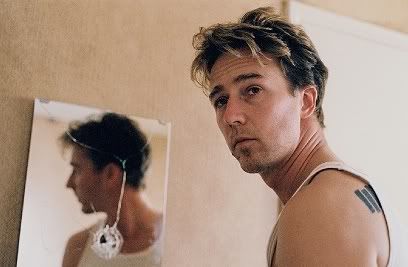Where Have All the Cowboys Gone?
If the world weren't such a cold, unforgiving place,
Down in the Valley would have been given the decent-budget / wide-release-Edward-Norton film treatment--in place of
The Illusionist. Sure, it's about a dozen times less marketable than a classy period piece, and it doesn't have any Giamatti, or a swellingly dramatic Philip Glass score. It's got all the indie trappings (weird storyline, Evan Rachel Wood) holding it back. I realize this. But, it's a much better film than that soggy magician one, and it most certainly didn't deserve its
blink and you'll miss it theatrical run, or hardly-rented DVD status. At the very least, it should have made some waves.
Why? Well, not only does
Valley hold Norton's best, riskiest performance since
25th Hour, it's also one of the few genuinely imaginative, original works to come out of American film within the past few years. An effortlessly passionate story that transcends its small-scale setting, allowing the unfolding events to be weighted with life or death importance.
Norton plays Harlan, a man woefully out of place in modern-day San Fernando Valley, who retains old school Western charm (of the cowboy hat-tipping "Howdy there, little lady." variety), and happens to tote loaded guns, should a need to save the day in a heroic shootout arise. It's while working at a gas pump that he meets Evan Rachel Wood's Tobe--short for "October"--and promptly renders himself unemployed by ditching his duties to visit the beach with her and her gal pals. Normally, warning bells would go off here, with this guy being at least 15 years her senior, and willingly taking extreme measurements to be with her. Yet Harlan seems so unassumingly kind, and clueless: you feel more protective of him than the teenage girl he's courting.
Of course, though, their uneasy romance begins to crumble into American Dream-cum-nightmare territory, by way of an overprotective dad, some decidedly shady behavior from Harlan, and a whole lot of gunplay. By the end of the film, it's taken so many quirky turns, led its characters to such strange places, it's unclear who should be the 'bad guy,' or if there is one at all. Harlan, while earnest and well-meaning, ain't no John Wayne. And Tobe's family, reacting through fear and confusion, manage to inadvertently push him over the already-well-in-view edge. Maybe there's no right or wrong here--only broken hopes, childlike innocence, hasty reactions, and doomed figures. All the better, if you ask me.
This Shakespearean tragedy, things gone awry aspect is what makes
Down in the Valley impossible to shake. Writer/director David Jacobson handles every extreme genre shift so deftly, I'm left feeling optimistic about what he may tackle next (and forgiving of his previous effort,
Criminal). And, hey, if all else fails and nothing here appeals to you, there's a real nice
Taxi Driver homage.




